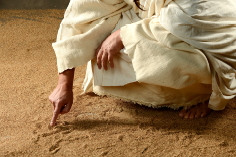 Many people often gathered in the temple to hear Jesus proclaim the gospel of the kingdom of God. Even the Pharisees, the leaders of the temple, attended these meetings. When Jesus was teaching, they brought to him a woman who had been caught in adultery and placed her in the middle. They demanded that Jesus deal with this situation, which forced him to pause his teaching. According to Jewish law, the punishment for the sin of adultery was death by stoning. The Pharisees wanted to know Jesus' answer to their question: "Teacher, this woman has been caught in the act of adultery. Moses commanded us in the law to stone such women. What are you saying?" (John 8,4-5).
Many people often gathered in the temple to hear Jesus proclaim the gospel of the kingdom of God. Even the Pharisees, the leaders of the temple, attended these meetings. When Jesus was teaching, they brought to him a woman who had been caught in adultery and placed her in the middle. They demanded that Jesus deal with this situation, which forced him to pause his teaching. According to Jewish law, the punishment for the sin of adultery was death by stoning. The Pharisees wanted to know Jesus' answer to their question: "Teacher, this woman has been caught in the act of adultery. Moses commanded us in the law to stone such women. What are you saying?" (John 8,4-5).
If Jesus acquitted the woman and thereby violated the law, the Pharisees were ready to attack him. Jesus bent down and wrote on the ground with his finger. Apparently the Pharisees thought that Jesus was ignoring them and became very loud. Nobody knew what Jesus wrote. What he did next made it clear that he had not only heard her, but also knew her thoughts. This reversed the woman's condemnation of her accusers.
Jesus stood up and said to them, “Let him who is without sin among you be the first to cast a stone at her” (John 8,7). Jesus did not quote from the Torah or excuse the woman's guilt. The words that Jesus spoke greatly amazed the scribes and Pharisees. Would anyone dare to be the executor of punishment to the woman? Here we learn to be very careful when judging other people. We should hate the sin we may find in other people, but never the person themselves. Help him, pray for him. But never throw stones at him.
Meanwhile, they tried to show Jesus how wrong he was in his teachings. Again Jesus bent down and wrote on the ground. What did he write? Nobody knows except the accusers. But whatever sins these accusers had committed, they were written in their own hearts, as with a pen of iron: "The sin of Judah is written with a stylus of iron and with a point of diamond engraved on the tablet of their hearts and on the horns of their altars" ( Jeremiah 17,1).
Shocked, the scribes and Pharisees dropped the case, fearful of continuing to tempt Jesus: “When they heard this, they went out one by one, the elders first; and Jesus remained alone with the woman standing in the middle" (John 8,9).
The writer of Hebrews says: "For the word of God is living and powerful and sharper than any two-edged sword, piercing to the division of soul and spirit and marrow and joints, and is a judge of the thoughts and intentions of the heart" (Hebrews 4,12).
She was brought to Jesus to be judged by him and awaited judgment. She was probably afraid and didn't know how Jesus would judge her. Jesus was sinless and could have cast the first stone. He came to earth to save sinners. Jesus stood up and said to her: “Where are they, woman? Didn’t anyone condemn you?” She addressed Jesus very respectfully and said: “No one, Lord!” Then Jesus said to her: “Neither do I condemn you!” Jesus added something very important: “Go and sin no more” (John 8,10-11). Jesus wanted to bring the woman to repentance by showing her his great mercy.
The woman knew she had sinned. How did these words affect her? “No creature is hidden from him, but everything is exposed and revealed to the sight of him to whom we must give an account” (Hebrews 4,13).
Jesus knew what was going on with this woman. God's grace in granting us the forgiveness of our sins should be a constant motivation for us to live our lives and not want to sin anymore. When we are tempted, Jesus wants us to look up to him: "For God did not send his Son into the world to condemn the world, but that the world might be saved through him" (John 3,17).
Do you fear Jesus? You shouldn't be afraid. He did not come to accuse and condemn you, but to save you.
by Bill Pearce
More articles about mercy:
This website contains a diverse selection of Christian literature in German. Translation of the website by Google Translate.